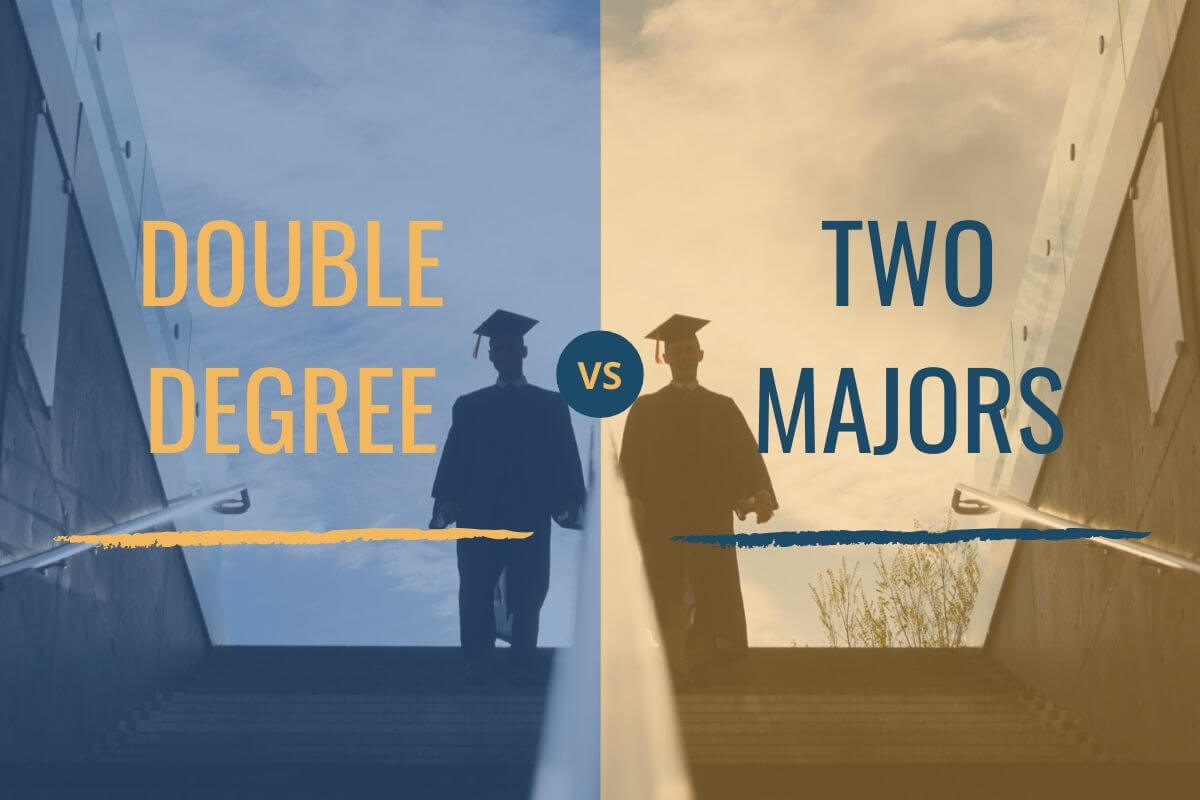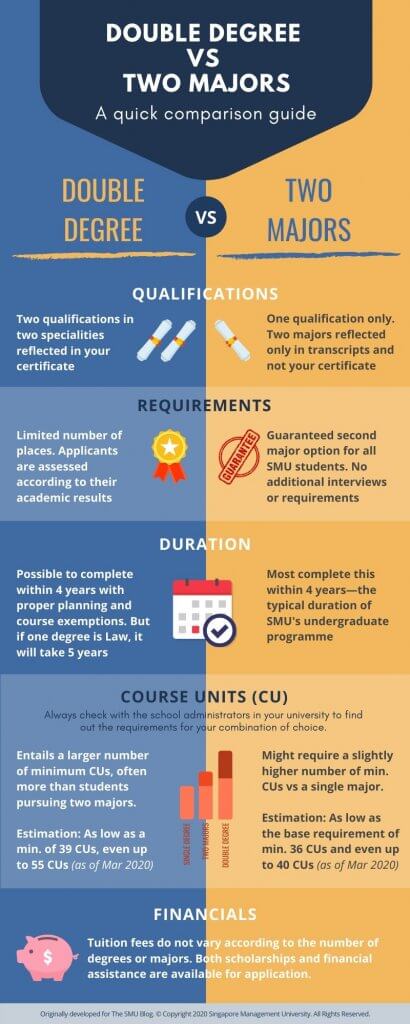
“Should I pursue a double degree or a second major?”
“SMU offers all students a guaranteed second major—can I take a double degree AND a second major?”
These are some of the questions you might be asking yourself as you embark on your university journey. In fact, it could be one of the earliest decisions you’ll have to make, and one that may prove to be a big influence on not just your experience of your education, but also your future career path.
With the options of pursuing a ‘single degree, single major’, ‘single degree with two majors’, ‘double degree, single major’, or a ‘double degree with two majors’ in Singapore Management University’s (SMU) undergraduate programme, this often puts many students in quite a quandary as they ponder which to take on.
Not sure what to do? Read on to get some clarity on the choice that will work best for you.
Double degree vs two majors—what’s the difference?
That’s a question with many answers, most of which we’ll get to below. But for starters, the key difference revolves around qualification and depth.
A double degree gives you indepth knowledge and recognised qualifications (or degrees) in two specialities. This, of course, involves a heavier workload.
Taking on two majors, in comparison, means you’ll graduate with specialisations in two disciplines but just one primary qualification. Your two majors will not be shown on your degree certificate, but will be indicated on your academic transcripts.
That’s not to say that with two majors you won’t enjoy some of the benefits that a double degree offers. For example, in the case of SMU, you’ll have the flexibility to taken up a second major from a different school within the university. Also, second major could open doors to more career opportunities.
So, some questions you should ask yourself when making this choice include:
- What are my academic/intellectual interests?
- What are my future career aspirations?
- What do I want from my university life?
Taking on two majors, for instance, typically appeals to students with a primary interest in one field and a secondary interest in another field that could serve to complement their primary interest. A double degree may appeal to students with very strong interests in distinct subjects and/or career pathways and who are prepared to put in the extra time and effort to build both depth and breadth in different fields.
Are there different admissions requirements?
In short, yes.
If you are offered a place at SMU, you are guaranteed the option of a second major. You don’t need to choose a second major until your second year, so there’s plenty of time to explore your options before you decide. And if you do decide on one, you don’t need to go through any additional interviews and admissions requirements (phew!).
If you want a double degree, however, you need to indicate that interest much earlier—on your SMU undergraduate application form. That’s because there are a limited number of places in the double degree programme, and applicants are assessed according to their academic results. If you are not offered direct admission into the double degree programme, don’t be dismayed; you’ll have the opportunity to try again by the end of your second year if you meet the GPA and minimum-grade requirements.
Will taking a double degree or two majors mean a longer length of study?
Not necessarily. A large part of it depends on your time table management.
In fact, most SMU students taking a second major complete their studies within four years—which is the typical duration for SMU’s undergraduate programmes.
Students taking double degrees can also complete their programme in four years, with proper planning and course exemptions. For example, some courses can be double-counted towards the requirements of both degrees. However, if one of your two degrees is in Law, then your double degree programme will take five years.
How different are the course unit requirements?
The long and short of it is that taking on a double degree would entail a larger number of minimum course units (CUs) to meet the graduation requirements.
To give you a sense of how different it could be: at the base level, for a student taking on a single degree with a single major in SMU, he/she would typically need to complete at least 36 CUs. If the student was pursuing a single degree with a second major, the required minimum could range from 36 CUs and even up to 40 CUs. Now, for a double degree, this goes up another notch with a required minimum from as low as 39 CUs and even up to 55 CUs.*
At the end of the day, it all depends on your double degree or second major combinations. It’s always best to check in with the school administrators in your university to find out the requirements for your combination of choice. Check out the full list of 300+ combinations SMU has to offer here.
*The estimations provided above are accurate as of March 2020 and may be subjected to changes.
Are there any career implications?
A double degree could potentially open up more career pathways, given that you will have indepth knowledge of two specialities. However, we believe that it is the ethos of an SMU education—preparing students to be future-ready through a curriculum that emphasises interdisciplinary learning, breadth and depth of thinking and the debate and exchange of viewpoints—that results in SMU students being highly sought after by top employers.
Bottom line: there are many variables that could lead you down different career pathways, even your own priorities and experiences at different points of your working life.
What about cost and financial assistance schemes?
Tuition fees are determined by your undergraduate programme choice and do not vary according to the number of degrees and majors.
As for financial assistance, SMU offers a wide array of scholarships and financial assistance schemes for students.



